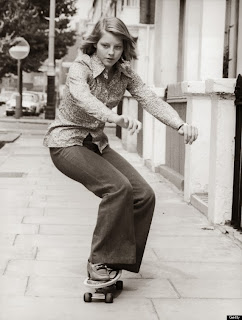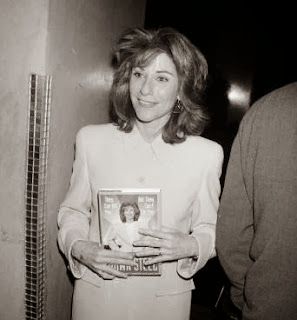 |
| Jodie Foster |
As some of you may have gathered, I don't often (ever) review nonfiction media pieces on this blog. This comes for a couple of reasons. First, they're just not as interesting to analyze. I mean, with nonfiction mostly you're just arguing about whether or not it's well-executed, because you can't judge on the basis of whether or not it's interesting or a good story - what you find boring could be your best friend's pick of the month. True in fiction as well, I suppose, but more true here where interest level is paramount.
Another reason is that I'm simply not as good at being witty in nonfiction, and then there's the fact that most of the nonfiction books I read are only vaguely related to the issues of women and popular culture. I mean, I too have other interests. It does happen. I quite like documentaries about ballet and books about the fishing industry. We all have our quirks.
But today we're taking a brief break from normalcy to talk about a book that is, in fact, highly relevant to this blog, and also well written and a good story and all that jazz. The book? Is That A Gun In Your Pocket? by Rachel Abramovitz.
The book is a compilation of interviews, research, and darn good writing that paints a history of the women in Hollywood. But not just the fictional characters who showed up on screen. No, this book is about the women who made those women on screen. The ones who produced, directed, wrote, acted, managed, agented, and so on, in order to make the movies happen. It's a book about the real women behind the scenes and how freaking hard it was for them to come to power in Hollywood in the sixties through the nineties.
It's not a whole lot easier now, to be honest. We just don't talk about it as much.
And that's a huge part of what drew me to this book in the first place. I mean, on the one hand, I'm totally sick of the whole Hollywood power structure. I used to work there, and I am one hundred percent done with oversized egos, the personal assistant culture, and the indignity of working for a production company that prefers paying you in "experience" rather than money.
 |
| Dawn Steel |
The book follows a lot of different artists, from the well known performers, like Meryl Streep, Jodie Foster, and Barbra Streisand, to the lesser known directors and producers, like Paula Weinstein and Polly Platt, and then on to the writers, like Callie Khouri, and the studio heads, like Dawn Steel and Sherry Lansing. It follows everyone, all different sides of the business to create a comprehensive view of the way Hollywood was moving and transforming, and how the role of women in the business changed over that time.
I spend a lot of time talking about the women in movies and television, but not nearly as much time thinking about the women who make movies and television. Which is a real shame, because those women are interesting, and more than that, they're important.
Without women in the driver's seat, we often get movies that don't seem to know women well. Without women who write, direct, and produce, we don't get movies for women, about women, by women. We need them. We need the perspective. And we need to remember them.
We need to remember the women who paved the way, so that we can remember to keep fighting for better representation and better stories. We need to remember the women who started it so that we can keep it going. And we need to remember that we are in it together.
Mostly, we need to remember the women behind the camera as well as the ones in front of it.
 |
| Nora Ephron |

No comments:
Post a Comment